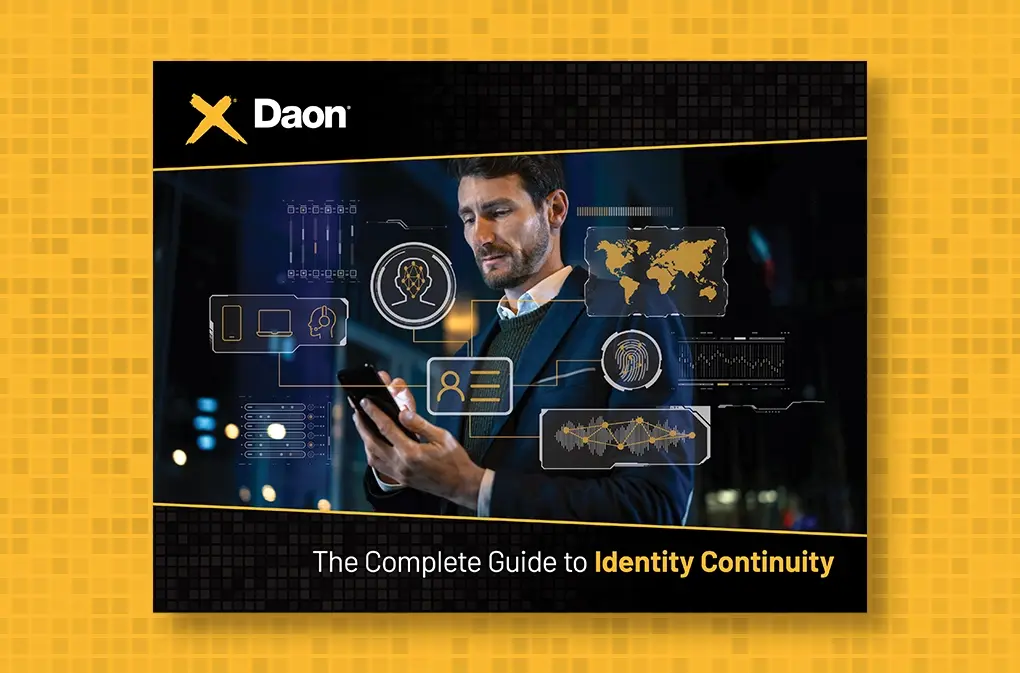Here’s Why You Should Partner with a Digital Identity Company
With fraud on the rise and consumer regulations increasing, having a secure digital identity verification strategy can mean the difference between fines and customer churn vs. a positive brand reputation and cost savings.
During the pandemic, consumers and enterprises were forced to do business solely online. Now, many continue to embrace the convenience and ease of the digital world, with Zippia reporting that 29.7% of American business is conducted online. According to Oberlo, “As it stands in 2023, the number of digital buyers is at 2.64 billion. This makes up 33.3% of the population worldwide.” In the financial industry alone, the Forbes Advisor 2022 Digital Banking Survey found that 78% of adults in the U.S. prefer to bank via a mobile app or website.
But with more people opening accounts and making transactions online, there are even more opportunities for identity fraud. CNBC reported that, according to the U.S. Department of Treasury, by early March, the Internal Revenue Service had flagged more than one million tax returns for potential identity theft during the 2023 tax season. As cited by the Insurance Information Institute, The U.S. Federal Trade Commission’s Consumer Sentinel Network Data Book 2022 found that two of the top three types of reported identity fraud were new credit card accounts and new bank accounts.
With fraud on the rise, companies can stay ahead of the curve (and of fraudsters) by partnering with a digital identity specialist from a reputable company.
What Is Digital Identity Verification?
Digital identity verification helps to thwart fraud by ensuring a person opening a new account is a real person and that they are truly who they claim to be. Also called identity verification, digital onboarding, or eKYC, the digital identity verification process starts with prompting the customer to provide a government-issued ID document as proof of their identity. This typically entails the customer capturing an image of their driver’s license or passport or uploading an electronic identity document. Then, the customer needs to provide proof that they are truly the person identified in the document. This can be accomplished by the customer capturing a short live video of themselves or taking a selfie that can be compared to the photo on their ID. The document and selfie, the latter of which functions as a secure biometric facial template, are analyzed to ensure they are both live, real, and unaltered and that the images match. During identity verification, the document and facial image can also be checked against a variety of databases, including fraud watchlists, to keep bad actors from opening accounts.
When Should I Receive Digital Identity Verification Service??
A smooth digital identity verification process offers key benefits to a business and its customers. While many businesses choose to develop their digital identity strategy and undertake implementation in-house, there are several reasons to consider partnering with a digital identity provider instead.
Think about your in-house team’s experience with digital identity. Security is top of mind for most CIOs, with 70% of respondents in Foundry’s State of the CIO Study 2023 saying they expected their involvement in cybersecurity to increase. However, digital identity verification is actually a balance between security and customer experience, and only 53% of CIOs in the Foundry study anticipated increased involvement in customer experience. Working with a digital identity specialist can overcome gaps in an internal team’s training and experience without needing to hire extra team members.
A partnership can also help you bring your team’s digital identity expertise rapidly up to speed with changing conditions. For example, in industries with heavy regulations, such as financial services and healthcare, or regions with unique requirements, such as the GDPR in the EU and the CCPA in California, a partner may be able to ease the burden on your internal team in developing compliant identity programs.
Every company is different, and working with a digital identity specialist may help develop a program and processes that fit the unique needs of your company and your customers. It’s important to find a provider who can help you get the most out of a best-fit solution.
Here are some of the key benefits of a modern identity verification process, which a digital identity specialist should be able to help you exploit to your full advantage.
Improve Customer Experience
Your customers have conflicting desires around security. They want their data to be secure and fraudsters to be kept out of their accounts. At the same time, they want their onboarding and account access processes to be simple and convenient.
In a recent survey, Daon found that consumers are increasingly distrusting of passwords and ever-vigilant of the security risks associated with legacy authentication factors like passwords. Though passwords are among the least secure ways to grant account access, they are also among the most commonly used methods. And yet, businesses are losing sales because people can’t remember their passwords and perceive re-setting them as a hassle.
That’s why it’s critical to create digital identity verification processes that combine the highest security factors – like biometrics – with customer ease.
Detect And Reduce Fraud
Digital identity verification helps you keep fraudsters out of your system. The document verification processes run on the government-issued ID lets you avoid accepting fake or altered documents. Liveness detection checks performed in the background when a customer takes their selfie stop criminals from using previously taken photos, still images from videos, or more advanced types of spoofing, like deep fakes. Running the ID data against databases enables you to ensure that the prospective account holder isn’t on a fraud watchlist and that they have a history that helps to establish them as a real person with a genuine identity.
Digital identity fraud attempts and keeping the people associated with them out of your system is a critical function of any business’s identity security protocols.
Enhance Customer Trust
Customer relationships are built on trust. When customers share their personal information with an organization, they expect that business to protect it – at all costs.
Your digital identity verification processes are visible proof of your efforts to ensure the safety of customer data and to provide customers with a reason to trust you from the very beginning of their business relationship with you.
Digital identity verification makes a promise to customers – from the very first interaction – that they can entrust their data to your business. It’s a strong message that shouldn’t be overlooked and one that needs to echo across the entire customer journey.
Boost Operational Efficiency
Automation and artificial intelligence (AI) can streamline your digital identity authentication processes and make them more thorough.
AI-driven technology can run data analysis and comparison against outside information sources and enable more accurate decisions in a fraction of the time it would take a human to do the same. Customers also appreciate that these background processes can feel nearly instantaneous when they are opening an account.
Identity verification that uses AI-powered biometrics also provides the highest level of safety possible with a virtually negligible error rate, freeing your security and IT resources to focus on programs and projects instead of on individual verifications.
Protect Your Business’s Reputation
The cost of falling victim to fraudsters doesn’t stop with the cost of recovery. When word gets out that data has been breached, it impacts your business reputation, causing current customers to leave and prospective customers to consider competitors instead.
A Varonis study found that 65% of customers whose data was compromised felt betrayed by the company. Additionally, the research shows that 85% of victims will spread their negative experiences by word of mouth. The amplification that social media provides to bad news means that the impact of a single event on your business can last long after the issue has been resolved.
A crucial element in protecting your reputation, customer base, and growth potential is ensuring that fraudsters can’t gain access to customer accounts and transactions.
Improve Customer Acquisition And Retention
Just as a bad reputation hurts your company, a reputation for securing customer data as part of an overall great customer experience can make it easier to acquire new customers and retain those you have.
Happy customers will become advocates for your business, telling others and spreading the word on social media. How you secure and respect data and balance this with customer convenience plays a key role in attracting and retaining customers. Identity verification that leverages biometrics can be the perfect balance of UX and security your business needs to stay ahead in the market.
Ensure Regulatory Compliance
The regulatory environment grows more complex every day. Depending on where you do business and what industry your business is in, you may need to comply with a wide array of rules and regulations.
Some are implemented across regions, such as the EU’s GDPR. Others are more piecemeal. In the U.S., by the end of 2023, five states will have comprehensive data privacy protection laws. Three more have passed laws that go into effect in 2024, 2025, and 2026, and another 15 states have rules at various stages of the legislative process.
Depending on the industry, businesses may also be subject to an alphabet soup of federal rules, including HIPAA (healthcare), GLBA (financial institutions), and COPPA (websites and services that collect, use, or disclose children’s personal information). Failing to comply can be costly. The top 10 fines levied in 2020 to companies, including Meta and Google, totaled nearly €800 million.
Ensuring digital identity regulatory compliance means being able to prove that your business is performing due diligence to protect customers’ personal information. If you’re ever audited, digital identity verification processes can provide proof of how you’re handling customer data and using it to authorize accounts and transactions.
Speak to Our Identity Verification Service Providers
There are many digital identity specialists to choose from, depending on your business requirements and priorities. But there’s also a huge difference between just a provider and a true partner. To learn why Daon could be the perfect digital identity partner for your business, speak with one of our solutions experts today.








